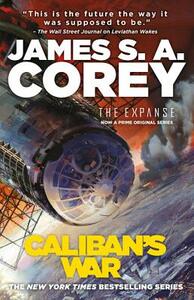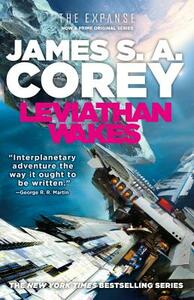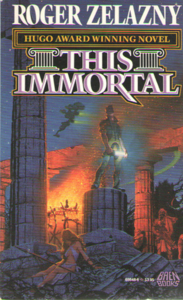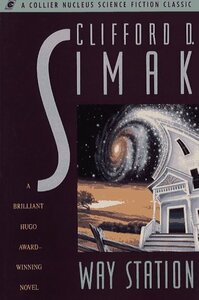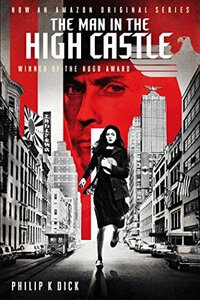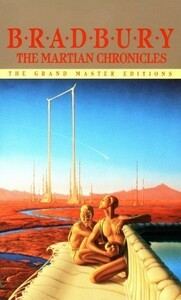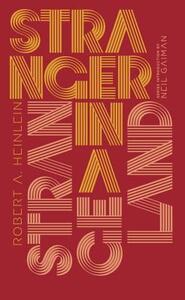You need to sign in or sign up before continuing.
Take a photo of a barcode or cover
geeklet's Reviews (338)
adventurous
medium-paced
Plot or Character Driven:
Plot
Strong character development:
Yes
Loveable characters:
Yes
Diverse cast of characters:
Yes
Flaws of characters a main focus:
No
adventurous
funny
mysterious
fast-paced
Plot or Character Driven:
Plot
Strong character development:
No
Loveable characters:
Yes
Diverse cast of characters:
Yes
Flaws of characters a main focus:
No
All in all, I think this novel is a fantastic opening book for a long series. The story can easily stand on its own but I feel like it did a wonderful job introducing us to the world and the characters. I feel like I have a good understanding of who are main characters are but I know that I have so much more to learn about them. I feel the same way about the worldbuilding. The book did a fantastic job introducing us to the different political groups at play but it's obvious the surface has barely been scratched. I'm really looking forward to learning more about Earth, Mars, and the Belt.
Compared to the TV show, I do think I liked the book more. I'm not a huge fan of detective stories and I never really connected to Miller in the show. However, the book gave him more of a personality. I could see how sad he was. He was a far more dynamic character than just grizzled cop archetype that I thought he was in the show. Holden is still naive Holden but it feels more like his personality in the book. In the show, Holden just comes off naive because he's simply unaware. In the book, he seems to believe that people are good and he is good. This makes his crew's dedication to him feel more real
Compared to the TV show, I do think I liked the book more. I'm not a huge fan of detective stories and I never really connected to Miller in the show. However, the book gave him more of a personality. I could see how sad he was. He was a far more dynamic character than just grizzled cop archetype that I thought he was in the show. Holden is still naive Holden but it feels more like his personality in the book. In the show, Holden just comes off naive because he's simply unaware. In the book, he seems to believe that people are good and he is good. This makes his crew's dedication to him feel more real
adventurous
medium-paced
Plot or Character Driven:
Plot
Strong character development:
No
Loveable characters:
Yes
Diverse cast of characters:
Complicated
Flaws of characters a main focus:
No
adventurous
medium-paced
Plot or Character Driven:
Plot
Strong character development:
No
Loveable characters:
Yes
Diverse cast of characters:
Yes
Flaws of characters a main focus:
No
adventurous
challenging
slow-paced
Plot or Character Driven:
Plot
Strong character development:
No
Loveable characters:
N/A
Diverse cast of characters:
Complicated
Flaws of characters a main focus:
N/A
adventurous
medium-paced
Plot or Character Driven:
Plot
Strong character development:
No
Loveable characters:
No
Diverse cast of characters:
Yes
Flaws of characters a main focus:
No
emotional
slow-paced
Plot or Character Driven:
A mix
Strong character development:
Yes
Loveable characters:
Yes
Diverse cast of characters:
No
Flaws of characters a main focus:
No
TL; DR: Hmm, slightly less than 4 stars. Like 3 big stars and one kinda puny star.
Book 10 down for my Hugo/Nebula read through down!
There were a lot of aspects of this novel that I really enjoyed. I found it pretty easy to connect to Simak's writing style. While he may not have used the most accurate technojargon associated with science fiction, he was able to really draw me into his world. While I wouldn't say the language was beautiful, it was a step above a lot of science fiction prose. I thought he did a fantastic job describing the setting of the farm. He was very effective at capturing a mood. I could feel the isolation and age of the farm and the surrounding land. I connected to Enoch's suffering. As a reader, I was easily able to sympathize with Enoch's loneliness. This mood built slowly throughout the book. By the end, Enoch's change in emotion was able to carry a strong impact. I also really connected to the themes explored in the book. Since I connected so easily to Enoch, I was able to explore the theme of alienation and isolation. I also liked how Simak explored the idea of a man outliving the world where he was from. I don't know anything about the author but this book was written during a time of great social and technological change. Enoch knew about the world and time that he was living in but he was never really a part of it. I think that's a fascinating idea to look at.
However, I didn't really care that much for the actual story. Well, I guess that's a bit of a lie. I really liked the setup. The entire idea of an intergalactic way station quietly existing in a back corner of Wisconsin was a really interesting concept to explore. Once we get into the plot, that's where things fell apart for me a little bit. There are a few subplots that fell completely flat with me. It's not that I think they're bad subplots, they just felt disconnected from the mood of the story. Everything about the government official seemed out of place. A lot of that story occured off screen and it made that plot seem a little nonsensical. I felt the same about the shadow people that Enoch created. I can see where Simak was going with the idea but it was a little unnecessary for the plot. Everything is wrapped up in an extraordinary convenient way. Who would have thought that so many problem solving events would occur at the same time in a piddily little way station in the middle of nowhere?
Thankfully, I was able to enjoy the quiet parts of the story far more than I disliked the active parts of the story. I have very fond thoughts of this book and I'm open to reading more Simak in the future.
Book 10 down for my Hugo/Nebula read through down!
There were a lot of aspects of this novel that I really enjoyed. I found it pretty easy to connect to Simak's writing style. While he may not have used the most accurate technojargon associated with science fiction, he was able to really draw me into his world. While I wouldn't say the language was beautiful, it was a step above a lot of science fiction prose. I thought he did a fantastic job describing the setting of the farm. He was very effective at capturing a mood. I could feel the isolation and age of the farm and the surrounding land. I connected to Enoch's suffering. As a reader, I was easily able to sympathize with Enoch's loneliness. This mood built slowly throughout the book. By the end, Enoch's change in emotion was able to carry a strong impact. I also really connected to the themes explored in the book. Since I connected so easily to Enoch, I was able to explore the theme of alienation and isolation. I also liked how Simak explored the idea of a man outliving the world where he was from. I don't know anything about the author but this book was written during a time of great social and technological change. Enoch knew about the world and time that he was living in but he was never really a part of it. I think that's a fascinating idea to look at.
However, I didn't really care that much for the actual story. Well, I guess that's a bit of a lie. I really liked the setup. The entire idea of an intergalactic way station quietly existing in a back corner of Wisconsin was a really interesting concept to explore. Once we get into the plot, that's where things fell apart for me a little bit. There are a few subplots that fell completely flat with me. It's not that I think they're bad subplots, they just felt disconnected from the mood of the story. Everything about the government official seemed out of place. A lot of that story occured off screen and it made that plot seem a little nonsensical. I felt the same about the shadow people that Enoch created. I can see where Simak was going with the idea but it was a little unnecessary for the plot. Everything is wrapped up in an extraordinary convenient way. Who would have thought that so many problem solving events would occur at the same time in a piddily little way station in the middle of nowhere?
Thankfully, I was able to enjoy the quiet parts of the story far more than I disliked the active parts of the story. I have very fond thoughts of this book and I'm open to reading more Simak in the future.
adventurous
dark
mysterious
medium-paced
Plot or Character Driven:
Plot
Strong character development:
No
Loveable characters:
No
Diverse cast of characters:
Yes
Flaws of characters a main focus:
No
adventurous
challenging
dark
emotional
inspiring
mysterious
reflective
slow-paced
Plot or Character Driven:
Plot
Strong character development:
No
Loveable characters:
Yes
Diverse cast of characters:
Yes
Flaws of characters a main focus:
Complicated
adventurous
challenging
medium-paced
Plot or Character Driven:
A mix
Strong character development:
Complicated
Loveable characters:
No
Diverse cast of characters:
Yes
Flaws of characters a main focus:
Complicated
TL; DR: Uhhh....I hate it but I fully respect it. The star rating is nothing but my personal enjoyment of the book, which was very low. However, if I was using the star rating for the book’s significance, it would be a lot higher.
I was doing just fine and dandy with my read of SFF award winners until this doozy landed in my lap. Heinlein, what a character. He's the kind of guy who could only exist in real life because a thousand fiction creators working for a thousand years couldn't make a person like him up.
Long story short, our boy Valentine Michael Smith is a Martian. He was born to a group of scientists who travelled to the red planet. He's discovered by a later expedition and brought back to Earth. Now Mike doesn't really understand this whole being human thing. He was, after all, raised by Martians. Thankfully for him, he quickly makes some great friends who spring him out of the government's eye. He meets a grumpy old writer/lawyer/doctor/philosopher/smartest guy in the room who is absolutely a stand-in for Robert Heinlein himself. Then he goes to church, joins a circus, and creates a sex cult. As one tends to do when they're a stranger in a strange land I suppose.
There's a brilliance to this novel that is directly connected to the time and place that it was created in. Heinlein worked on this novel for years and it absolutely came out at the right time. If he had published this novel just five years before he did, I'm not sure if it would have catapulted to the heights that it achieved. Heinlein strikes out at the trappings that he finds in Western culture and absolutely challenges the reader to examine their own perception of the world around them. To accept that one is God, one must accept the responsibility of choices. It's more than a simple affirmation. It's a dedication to bear the weight of your decisions. It can be an appealing world view but it's a difficult way to live. Heinlein asks the reader to take full responsibility for themselves. I found his examination of religion to be the most fascinating of all of the topics he took a crack at in this story. In a book that's heralded as a book about sexual freedom, I didn't really expect to find such a critical look at religion institutions.
All of that being said, I did absolutely hate this book. For starters, it's just so dated. As someone born well after the 60's, the themes of this book just don't hit the same way. I really do think I have a strong stomach for sexism in books but sweet Mother of God, this book drove me directly to my breaking point. By the end, I was really missing older sci-fi books where women were just absent. Heinlein's characters are charismatic but rarely stand up to a sniff test. The women are all beautiful, smart, and are completely okay with the occasional sexual harassment. The men are witty and masters of all. I was probably about 150 pages into the book before I got to the point where I wasn't furious that I was reading it. I never really enjoyed myself. Maybe I'm more of a prude than I thought but man, I did not want to read about a sex cult for that long. Surely there are other ways to express happiness and fullness with others. Heinlein danced with the idea that the Martian language changed how one perceives the world. I wish we could have seen more of that. Speaking of language, Heinlein really loved gratuitously shoving himself into a story. His self-insert character of Jubal would just drone on and on. Jubal had thoughts and he was not afraid to let Jubal's thoughts take up pages and pages.
Even though I didn't care much for this story, it's most certainly one that I will think about for a very long time. Ever notice how that happens? Some of the books that I dislike the most are the ones that just sit in my brain. Even in my dislike, I (guess) I'm glad this book exists. I'm sure the world would have been a bit of a different place without it. I don't really grok you Heinlein but that's okay too. Science fiction wouldn't be the same without your wacky little culture shifting books.
I was doing just fine and dandy with my read of SFF award winners until this doozy landed in my lap. Heinlein, what a character. He's the kind of guy who could only exist in real life because a thousand fiction creators working for a thousand years couldn't make a person like him up.
Long story short, our boy Valentine Michael Smith is a Martian. He was born to a group of scientists who travelled to the red planet. He's discovered by a later expedition and brought back to Earth. Now Mike doesn't really understand this whole being human thing. He was, after all, raised by Martians. Thankfully for him, he quickly makes some great friends who spring him out of the government's eye. He meets a grumpy old writer/lawyer/doctor/philosopher/smartest guy in the room who is absolutely a stand-in for Robert Heinlein himself. Then he goes to church, joins a circus, and creates a sex cult. As one tends to do when they're a stranger in a strange land I suppose.
There's a brilliance to this novel that is directly connected to the time and place that it was created in. Heinlein worked on this novel for years and it absolutely came out at the right time. If he had published this novel just five years before he did, I'm not sure if it would have catapulted to the heights that it achieved. Heinlein strikes out at the trappings that he finds in Western culture and absolutely challenges the reader to examine their own perception of the world around them. To accept that one is God, one must accept the responsibility of choices. It's more than a simple affirmation. It's a dedication to bear the weight of your decisions. It can be an appealing world view but it's a difficult way to live. Heinlein asks the reader to take full responsibility for themselves. I found his examination of religion to be the most fascinating of all of the topics he took a crack at in this story. In a book that's heralded as a book about sexual freedom, I didn't really expect to find such a critical look at religion institutions.
All of that being said, I did absolutely hate this book. For starters, it's just so dated. As someone born well after the 60's, the themes of this book just don't hit the same way. I really do think I have a strong stomach for sexism in books but sweet Mother of God, this book drove me directly to my breaking point. By the end, I was really missing older sci-fi books where women were just absent. Heinlein's characters are charismatic but rarely stand up to a sniff test. The women are all beautiful, smart, and are completely okay with the occasional sexual harassment. The men are witty and masters of all. I was probably about 150 pages into the book before I got to the point where I wasn't furious that I was reading it. I never really enjoyed myself. Maybe I'm more of a prude than I thought but man, I did not want to read about a sex cult for that long. Surely there are other ways to express happiness and fullness with others. Heinlein danced with the idea that the Martian language changed how one perceives the world. I wish we could have seen more of that. Speaking of language, Heinlein really loved gratuitously shoving himself into a story. His self-insert character of Jubal would just drone on and on. Jubal had thoughts and he was not afraid to let Jubal's thoughts take up pages and pages.
Even though I didn't care much for this story, it's most certainly one that I will think about for a very long time. Ever notice how that happens? Some of the books that I dislike the most are the ones that just sit in my brain. Even in my dislike, I (guess) I'm glad this book exists. I'm sure the world would have been a bit of a different place without it. I don't really grok you Heinlein but that's okay too. Science fiction wouldn't be the same without your wacky little culture shifting books.
